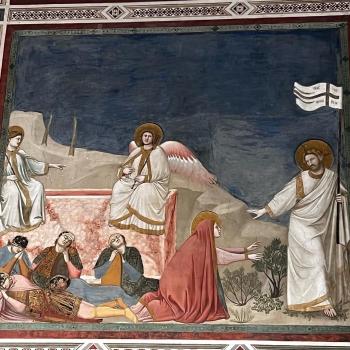
If the pen is mightier than the sword, the tiny conjunction just might be the mightiest weapon of all. On it, a sentence can expand or contract, emphasize or twist. Conjunctions connect and divide, turn and include. In the Bible, the simple one-syllable conjunction (even in the Greek and Hebrew) comes from God, so it holds the same power of an active verb or proper noun. What do I mean?
First, a primer: conjunctions are words that connect clauses and phrases. You see them everywhere: for, and, nor, but, or, yet, so, because, while, unless, still, as . . . and a few others. Their common, prolific usage makes them often invisible. But one well-placed conjunction can change the course of a thought.
Or a theology.
For such small words, we often imbue them with great significance. But should entire theologies hinge on a simple conjunction? I suppose the answer is “It depends.” Two huge areas of study, both significant to the entire human race, can be located within a conjunction. But only one, I believe, is strong enough to hold up.
Women in Leadership: “For”
 In my preparation for 40 Questions about Women in Ministry, 1 Timothy 2:8–15 stands out as the premier passage to address. It is central to the hierarch argument that women are not allowed to teach men with spiritual authority (or any sort of authority, some say).
In my preparation for 40 Questions about Women in Ministry, 1 Timothy 2:8–15 stands out as the premier passage to address. It is central to the hierarch argument that women are not allowed to teach men with spiritual authority (or any sort of authority, some say).
“I do not permit a woman to teach or to assume authority over a man; she must be quiet. For Adam was formed first, then Eve” (1 Tim 2:12–13).
The conjunction in question here is for, meaning because. Gar in the Greek, it’s a straightforward word depicting cause—”a because b.”
Verses 12–13 often appear as proof texts, evidence for how “clear” Scripture is about the limitations God has put on women. Look, they say, Paul is appealing to creation. Because Adam was formed first, it’s a timeless principle that women should not teach men rather than an application merely for Timothy’s context.
That’s a lot of weight for a tiny conjunction to hold. How well does gar bear up under the pressure of sustaining a theology of male priority?
Not well at all. Let’s review a few problems:
Was Paul Inconsistent?
If Paul, the author of 1 Timothy, meant his words in 2:12–13 to be universal, he did not practice what he ostensibly preached. He partnered with women to teach and preach and prophesy about Christ—often. Romans 16 mentions three primary women disciples: Phoebe, Priscilla, and Junia. Paul describes Priscilla, along with her husband, Aquila, as leading a church in their home (1 Cor. 16:19) and as correcting the young preacher, Apollo’s, theology (Acts 18:26). Taken together, the references to Priscilla show her to wield spiritual authority and the gift of teaching.
In Laodicea, the only person whose name we know is Nympha, the woman who hosted the church in her home. Women demonstrably led in the early church, during the apostles’ lifetimes and beyond. Why would Paul minister alongside women yet write that they were to remain quiet and not teach men ever at all? His words and practice do not jive.

The First Boss and His Assistant?
The reference to Adam and Eve points back to Genesis 2, the creation account in which the man was created first, followed by the woman fashioned from his side. Does Adam’s prior creation indicate preference or authority over the woman? Seeing the animals in pairs, he realized he did not have a partner/companion like him the way they had one like each other. So when he opened his eyes and saw the woman, he recognized her as like himself: “bone of my bone, flesh of my flesh” (Gen. 2:23).
Likewise, the woman is described as the man’s “ezer kenegdo,” a suitable companion or strong ally. English translations often use “helper”—a poor choice since the Hebrew has no connotation of rank or position of weakness. Rather it means ally or companion. The creation account emphasizes the two humans’ similarity and unity. It contains no hint of male authority.
Only when New Testament readers see 1 Timothy 2:13 do they turn back to Genesis 2 and assume that being created first gave Adam a special rank over Eve which carried on to all males over all females. But does that assumption hold up throughout the Bible? No, not every firstborn became the leader of his family. In fact, God often switched his choices to a younger sibling: Jacob over Esau, Joseph and Judah over Reuben, Gideon’s clan over the larger ones, David the youngest of seven . . .
And when Jesus came along, he taught that the first must be last, that the greater should serve the lesser. He taught an upside-down kingdom that upended the world’s ranking system.
What Was Going on in Ephesus?

Since context is king when it comes to biblical interpretation, we must investigate the culture and events in Ephesus during Paul’s day. Acts 19 tells us how Paul infuriated a mob of Artemis-worshipping craftsmen and townspeople when he disrupted their idol-making sales. Artemis worship was at the center of Ephesian life. New research from Dr. Sandra Glahn (coming soon in her book Nobody’s Mother, IVP Academic, which I’ve enthusiastically endorsed) reveals Artemis to be an ever-virgin, a lethal archer, patron of midwifery, and the dominant pagan deity in Ephesus and surrounding areas. Twin to the sun god, Apollo, she was born first, emerging fully developed, and watched her mother suffering childbirth with her brother. That experience, the myth goes, convinced her to remain childless. And her birth story stands in direct contrast to Genesis 2, where “Adam was created first, then Eve . . .”
The female-centric goddess worship elevated women’s social power in Ephesus. As new Christian converts, they joined the small house churches but needed to learn the correct doctrine and proper decorum. Rather than jumping in to lead or even dominate, they needed to learn quietly and let go of their Artemis mindset of female superiority. Reread 1 Timothy 2:8–15 in light of the myth and consider whether Paul might be answering pagan worship with the true and greater savior, Jesus.
A “For”-Gone Conclusion?
Along with the Artemis worship element as critical background to Paul’s context, we consider the mutuality of the Genesis 2 creation story and Paul’s practice of partnering with qualified women to teach. Taken together, the evidence shows that the conjunction gar (for) in 1 Timothy 2:13 cannot support the theology of male authority.
God our Savior: “But”
Few phrases in the Bible carry the power of these two words: But God . . . In context, the phrase is usually prefaced by something terrible about humanity—our sin, our faithlessness, our hopeless future, our lostness—then followed by something glorious. For example:
Very rarely will anyone die for a righteous person, though for a good person someone might possibly dare to die. But God demonstrates his own love for us in this: While we were still sinners, Christ died for us (Rom 5:7–8).
The conjunction but indicates a reversal, an action halted so a different action can begin. When used to describe something God is doing, the word is revolutionary. In Romans 5, quoted above, Paul contrasts finite humans unwilling to sacrifice themselves even for a good person (much less an evil one) with God, who died for us even while we were in the pit of our sin. His love shines in the way he sacrificed himself on our behalf.
And it’s the best news ever told. The salvation of humanity rests upon the actions of God revealed in the conjunction, but (de, in Greek).
We find God intervening in saving ways throughout Scripture:
Genesis 8:1— Noah and his family have been in the ark for weeks. “But God remembered Noah and all the wild animals and the livestock that were with him in the ark, and he sent a wind over the earth, and the waters receded.”
Genesis 50:20— Joseph is comforting his brothers after their father died, assuring them that he bore them no ill will for the way they’d mistreated him as a youth. “You intended to harm me, but God intended it for good to accomplish what is now being done, the saving of many lives.”
Deuteronomy 6:21— The cry of Israel as they remembered their deliverance from slavery: “We were slaves of Pharaoh in Egypt, but the Lord brought us out of Egypt with a mighty hand.”
Psalm 73:26— The troubled psalmist laments that evil people seem to prosper, but he rallies as he remembers God’s faithfulness:
My flesh and my heart may fail,
but God is the strength of my heart
and my portion forever.
1 Chronicles 16:26— As David brought the ark of the covenant back to Jerusalem and celebrated: “For all the gods of the nations are idols, but the Lord made the heavens.”
Acts 2:23–24— Speaking of Jesus, Peter told the people gathered in Jerusalem what had happened a mere fifty-ish days previously: “This man was handed over to you by God’s deliberate plan and foreknowledge; and you, with the help of wicked men, put him to death by nailing him to the cross. But God raised him from the dead, freeing him from the agony of death, because it was impossible for death to keep its hold on him.”
Acts 3:15— Peter again, speaking at a later date to more people in Jerusalem: “You killed the author of life, but God raised him from the dead.”
Acts 13:29–30— Another sermon, talking about Jesus: “When they had carried out all that was written about him, they took him down from the cross and laid him in a tomb. But God raised him from the dead.”
1 Corinthians 1:27— Comparing the philosophy of the age with the wisdom of God, Paul acknowledged that the world thought God’s wisdom was foolishness: “But God chose the foolish things of the world to shame the wise; God chose the weak things of the world to shame the strong.”
~~~~
But God . . . When these two words appear, we can find rest from our labors and comfort from our fears, for our creator Father has inserted himself into our circumstances in order to show his power, love, and righteousness. He could have waited to save us until we were worthy of it, but God knew we never would be and loved us anyway.
The doctrine of salvation requires God to overcome human frailty. We can try and try to get right with him, with no chance of success. BUT GOD reaches down in love to save us. We were lost in our depravity, BUT GOD sent Jesus to die in our place. When we see the coordinating conjunction that contrasts something with God, we can smile because it’s going to show us a glimpse of glory.
Can conjunctions carry entire theologies? When all of Scripture echoes the same story, yes.












